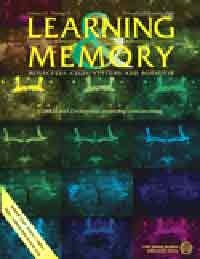Unlocking the mysteries of the brain
Submitted by Daniel Alfonso Colón-Ramos on
"Si por casualidad duermes, y sueñas que te acaricia la brisa..."
Those verses from Bobby Capó's song "SoÒando con Puerto Rico" transport us with their melody to the coasts of Puerto Rico. While taking this trip down memory lane, we relive the experience with the same intensity as if we were physically there. How is it that the brain allow us, just by thinking about it, to feel the tropical sun and dream of Puerto Rico?
In December's issue of the prestigious scientific journal Learning and Memory three articles by Puerto Rican authors were published, and those articles address these mysteries of the human brain.
In Dr. Sandra Peña de Ortiz's lab, at the UPR RÌo Piedras, authors and CienciaPR members Wanda I. Colón-Cesario and Michelle Martínez-Montemayor studied the role of transcription factor Nurr1 (a class of proteins that regulate gene expression) in the process of learning and memory. This group found that transcription factor Nurr1 is important in learning and regulates the formation of long term memories. The absence of these proteins leads to characteristics similar to those observed in schizophrenic, depressed and obsessive-compulsive patients, and these discoveries allow the biomedical community to better understand the molecular underpinnings of neuropsychiatric disorder.
At Yale University, Puerto Rican researcher Brian P. Ramos, under the mentorship of P.I. Dr. Amy F.T. Arnsten, also published an article regarding memory. Brian Ramos studied a class of drugs which improve memory, particularly in aging experimental animals. He characterized the molecular mechanisms by which these drugs act and identified their targets. His studies will help the biomedical community understand how memory is consolidated, and how to improve pharmacological approaches aimed at improving memory in aging patients.
The third article written by a Puerto Rican group and published in Learning and Memory belongs to the group of Dr. Gregory Quirk, at the Ponce School of Medicine. His graduate student Iván Vidal González identified brain regions that are important in regulating fear responses. His studies will have repercussions towards understanding how the brain processes traumatic experiences and could also offer medical solutions to people suffering post traumatic stress disorders.
The scientific accomplishments of these three groups will help us better understand the mysterious processes of learning and memory. These articles are also a reflection of the great level of scientific productivity displayed by the neuroscience community in Puerto Rico, which during the last fifty years contributed to our understanding of the human brain through their quality research.
PS: Iván Vidal González died tragically last year, when he drowned while successfully and heroically saving his girlfriend's life. A fellowship has been established in his name, and CienciaPR has developed a section in memoriam to honor and recognize the scientific accomplishments of this young Puerto Rican researcher.








